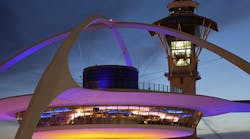Latest from Management
Sponsored
It was 2 a.m., and I was working my all night shift in emergency communications — known as MacOps — at McMurdo Station, Antarctica. As usual all had been quiet since about 9 p.m. and could be expected to stay that way for another four hours.
Suddenly breaking the silence, a heavily-accented male voice came over the radio. “MacOps, MacOps, this is Mario Zucchelli Station. How do you read me?”
Surprised, I lunged for the radio and said, “Mario Zucchelli Station, this is Mac Ops, I read you loud and clear. Go ahead please.”
Mario Zucchelli is the Italian Antarctic station, close by Antarctic standards.
“MacOps, we have need of an emergency landing of our plane at your station. Our plane has been circling our station for some time because we cannot find a break in our weather. He is low on fuel and heading your way.”
I was listening intently, wondering why he was telling me this.
He continued, “How is your weather, MacOps?”
I looked out the window. Even though it was the middle of the night, the sun was sparkling over the endless ice. It’s the Antarctic summer after all and the sun was always up.
I spoke into the radio, “Mario Zucchelli, McMurdo weather is clear.”
“Mac Ops, we are requesting permission to land at McMurdo.”
I gulped. He wants my permission to land an Italian plane? Landing planes was not part of my job. Many of you have heard my stories about working as a heating mechanic in Antarctica. But you haven’t heard about my second season as an emergency communications operator. It was radio communications, sometimes satellite phones, with science field camps across the Antarctic continent. My job was to keep tabs on everyone who left the safety of the station to do their jobs, whether scientists or the trades people who built and maintained the camps.
The job was 12-hour shifts. Nights were my favorite. I felt like I was the only person awake in the world. Yet the sun over the ice was still high in the sky, solar heat beaming through the windows making the room so hot that I often wore shorts and a sleeveless shirt.
I would look at the big map of Antarctica on the wall, with the stick pins of where the 30 or so field camps were, and think, wow, I can hardly believe where I am. Yet there I was — the emergency communications for a whole continent. There was no 911.
Yet daunting as this may sound, this was a typical “emergency” call from a remote field camp — “When’s the soonest you can get a helo (helicopter) out to us? This is an emergency. We need Oreo cookies right away. Lots of Oreos!”
Are Oreos an emergency? Easy decision. Is an emergency landing an emergency? Easy decision!
The plane landing
Once again the Italian-accented voice came over the radio, “MacOps, do you read me? We are requesting permission to land our plane at your station.”
“Roger that, Mario Zucchelli. Have you requested clearance from McMurdo Tower.”
“MacOps, we have no response from McMurdo Tower and need permission to land.”
“Please stand by, Mario Zucchelli.”
Since communications between McMurdo offices were done by phone, I would just call the Tower. And when I called there was no answer at Tower. The Tower was manned around the clock just like MacOps. Maybe he went to the john. I phoned again. Still no answer.
The Italian radio voice sounded again, “MacOps, MacOps, do you read me?”
What was I to do? Tower wasn’t answering, and everyone else in the station was asleep. After all, it was the middle of the night. What was I going to do about this plane that was running out of fuel?
Even though I’d never been in anything like this situation before, the sick feeling was familiar. It was like trying to get a boiler to start up when:
- The building owner or homeowner is screaming “Emergency!” (I know, no one ever died from a boiler going down, but try to tell the owner that.)
- Whatever is wrong shouldn’t be happening.
- It’s the middle of the night.
- There is no instruction manual or troubleshooting chart.
- There’s no one else around, so it’s all up to me. Yikes!
What does the troubleshooting process say? Do you have power? Yes. Is there fuel? Yes. What are all of the switches and are they on? Yep that works until you don’t know what all of the switches are, and you need a troubleshooting chart, and … there isn’t one! That’s where I was with this plane — feeling sick, sick, sick!
Just like the plane has to be landed, the boiler has to be started up, I told myself. People are depending on it! So, I decided I would figure this out and get it done.
I took a deep breath, got ready, and spoke into the radio, “Please continue to stand by, Mario Zucchelli Station.”
I phoned the Tower one more time, returned to the window, looking out over the full reach of the ice around the station. The sky was clear, no planes in the air, no planes on the runway. After all, it was the middle of the night.
“Mario Zucchelli, so far as I can tell, it looks (gulp) clear to land.”
“Roger than, MacOps. Thank you for your help.”
I continued to scan the sky outside the window and hope, hope, hope I did the right thing. Sure enough, a plane appeared on the horizon, hovered over the station briefly, and smoothly landed.
I sink into my chair with relief and begin to breathe again. A few minutes later the phone rings.
“What the heck MacOps, this is Tower! Did we just land a plane?”
Whew, just like starting up a boiler. Hear the blower, listen for the whoosh of the burner light-off, and voila, there’s heat. No matter the hell you just went through, all is well.
Carol Fey is a technical trainer and writer, specializing in easy electricity, hydronics and troubleshooting books. She also writes about HVAC work in Antarctica. You can find her and her books at carolfey.com.
Carol Fey
Carol Fey is a technical trainer and writer, specializing in easy electricity, hydronics and troubleshooting books. She also writes about HVAC work in Antarctica.



